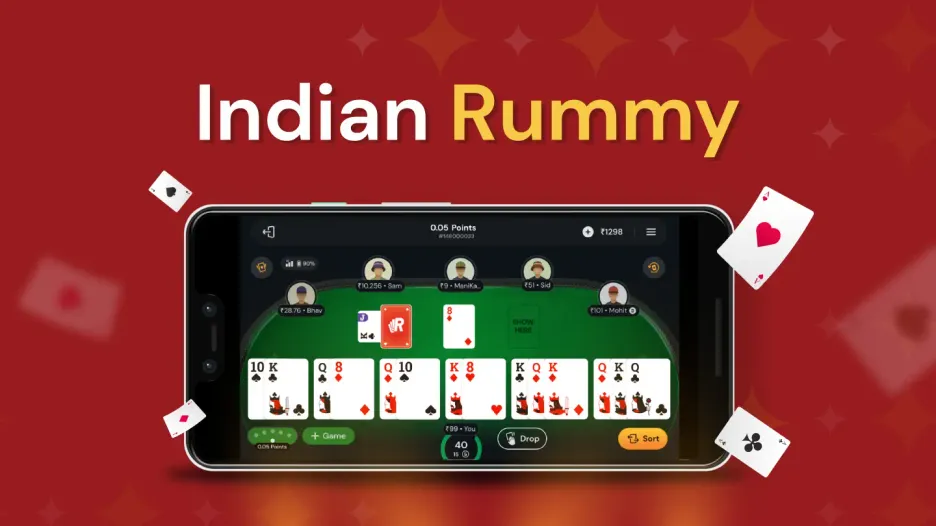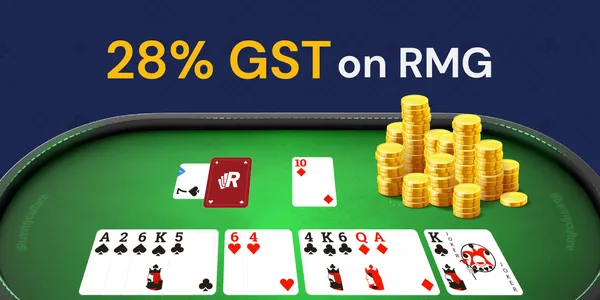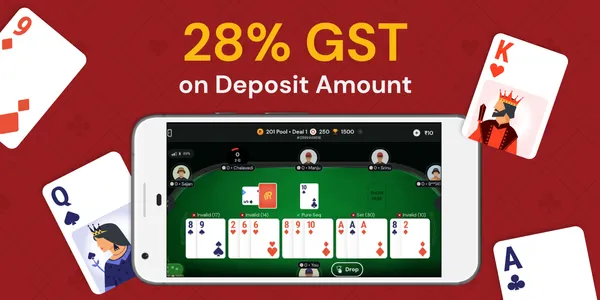Indian rummy game complete guide
Indian Rummy is a popular card game that originated in the 20th century. It is derived from Mexican Conquian, which is the origin of many versions of rummy played throughout the world. In time, Indian people revised the traditional rules and so Indian Rummy was born, a version of the game played all over the country today.
Also known as Paplu, it quickly became a favorite at home social gatherings, a family function, and for this reason also the online world. With the advent of online gaming, Indian Rummy online is also becoming popular, allowing players to fight thrilling card battles in any place and at any time.
The Indian game is typically played with 13 cards and players need to make valid sets and sequences. In Indian rummy, the goal is to combine the cards dealt to you, into sets and sequences, and claim a valid combination before your opponents. thanks to the advent of online Indian rummy, now you can enjoy the excitement of playing Indian Rummy online using various Rummyculture apps.

Indian Rummy
What is Indian rummy?
Indian rummy is one of the most celebrated card games in India. Just like the diverse Indian audience, the game of rummy has evolved over time, resulting in multiple variations. Indian Rummy, being widely accepted, has gained significant popularity among households in India.
Types of Indian rummy
Interestingly, there are two types of Indian Rummy: 13-card rummy and 21-card rummy. There isn't much difference between the two versions in terms of game rules; however, their popularity varies.
13-card rummy
This Indian Rummy variation also known as Paplu, is played with 13 cards and can be played among 2 to 6 players. The main objective of the 13 card rummy game is to arrange the cards to form sets and sequences and make a valid declaration to win the game.
21-card rummy
There is another version of Indian Rummy that is played with 21 cards and can be played among 2 or more players. Even though the rules of this version of the game are almost similar to the 13-card version, it’s not very popular among Indian players.
Indian rummy variations on RummyCulture
The 13-card Indian Rummy has three exciting variants that elevate the fun and entertainment of the game. Whether you’re a seasoned player or just starting, Indian Rummy online offers endless opportunities to enjoy this classic card game. On RummyCulture, you can experience the thrill of these rummy variants seamlessly. Download the Indian Rummy app today and start playing your favorite version of the game!
Deals rummy
In this variant of Indian Rummy, the number of deals is fixed before the start of the game. Each player gets a certain number of chips. The winner of a deal collects chips based on the score of other players. The player who has the highest number of chips after completing the fixed number of deals wins the game.
Pool rummy
This particular variant of Indian Rummy has 3 formats - Pool 61, Pool 101, and Pool 201.
The overall objective of the game is to not exceed a fixed score and this score is based on the format of the game. The winner is the last player remaining after all other players have exceeded the score limit (61, 101, 201).
Points rummy
This variant is always preferable for a quick game of Indian Rummy. The concept of this format is quite straightforward - players in the game need to make a valid declaration to win the game. The winner is the player who declares the cards first.
Indian Rummy Rules
As rummy is a game of skill and strategy, to progress from being a beginner to an expert, it is essential to be well versed with the rummy rules.
In Indian Rummy, the aim of the game is to form valid sets and sequences out of the 13 cards dealt to each player. For a valid declaration, there must be two sequences, and at least one of those sequences must be a pure sequence (a sequence without a Joker). When you play Indian Rummy online, it is played on the same basic principles, which gives newcomers and experienced players the same thorough enjoyment of their favourite game.
How to play Indian rummy
Card distribution
- Decks: Two packs of 52 playing cards each and printed Jokers.
- Players: The game is typically played between 2 to 6 players, whether offline or via an Indian Rummy app.
- Wild Jokers: In addition to the printed Jokers, a wild Joker is selected randomly at the start of each game.
Gameplay mechanics
- The players are dealt 13 cards each.
- The other cards become the draw pile, with one card face-up to begin the discard pile.
- Players alternate, drawing a card from either the draw pile or the discard pile and discarding one to the discard pile.
- The game ends when someone declares with valid sets and sequences.
Some keynotes to remember for the Indian rummy gameplay:
Shuffling and dealing
The game begins with a well-shuffled deck of cards. According to the rummy rule of the 13 card rummy, each player is dealt 13 cards. After dealing the cards, the remaining cards are kept face down on the table; the deck is called a closed deck.
Open card
The top card from the closed deck is kept face up to form the open deck. This card can be picked by a player on their turn.
Declaration of a wildcard joker
A random card is selected as the wildcard Joker, and all cards of that value become wildcard Jokers.
Drawing and discarding of cards
The game starts when a player draws a card from the open or closed deck. After picking up the card, the player has to discard a card to the open deck, and the card that has been discarded can be picked by the next player or the player can choose to pick a card from the closed deck.
Final declaration
Once the player forms the required sequences or sets, they should discard the last unwanted card in the 'Show here' slot and declare the cards.
Strategies and tips
Here are some rummy tips to remember while playing the indian rummy
Forming sequences and sets in Indian rummy
Why It Matters: A valid declaration in Indian Rummy requires at least one pure sequence. In the early stage of gameplay, keep an eye on forming a pure sequence so that your hand always remains eligible for declaration even if the game takes an unpredictable turn.
How to Use Jokers: Jokers can be used to create missing cards in sets or impure sequences. The strategy here is to use Jokers only to fill out high-scoring or key combos, which can help decrease your total score if the game ends suddenly.
Utilising Wild Jokers: At the beginning of the game, wild Jokers are chosen randomly and can replace any card in a set or impure sequence. Yet they are not eligible to become part of a pure sequence. Figuring out how to make the most of these Jokers can maximize your winning potential. In online Indian Rummy games, the use of a Joker card can often make the difference between winning and losing the game, so utilize it wisely.
Discarding cards
Minimize Points: Kings, queens, and aces have a high score if left unmelded. If you stick with them too long, you risk yourself with a large penalty score. So, it is always better to discard them first on your turn.
Observing Potential Combinations: Watching the cards that opponents may pick or discard from the pile can provide clues about their possible combinations. If an opponent consistently picks the 4♠, 5♠, for example, they are perhaps building a sequence in spades. This can let you identify what cards to put into your discard piles to hinder your opponents’ progress. Use this strategy to stay one step ahead of your opponents when playing Indian Rummy online.
Common terms related to Indian rummy
For beginners, achieving a deeper understanding of the game requires familiarity with the terminology associated with Indian Rummy. The glossary for Indian Rummy is predominantly in English, but it may become more hyperlocal based on geographical variations.
What is Set?
A set is a group of three or more cards of the same rank but different suits. The maximum number of cards that you can use to form a set without using any Jokers is 4, but you can create a set of up to seven cards if you are using Jokers. In 13-card rummy, you need to have at least two sequences (one needs to be a pure sequence). Since the minimum cards you need to form a sequence is three, therefore at least six cards will be used to form two sequences. This is why a set can be of a maximum of 7 cards.
What is Sequence?
A sequence can be formed with three or more consecutive cards of the same suit. Players need at least two sequences, one of which needs to be a pure sequence to make a valid declaration.
What is Discard?
The act of laying off an unwanted card on each turn is called discarding.
What is Drop?
If a player is not confident on the hand dealt, they can drop out of the game by using the “Drop” option. There is a penalty of 15 points for dropping before a single turn and 30 points for dropping after a turn, which will be added to their overall score.
What is Declare?
On completing the objective of the game, the player discards the last unwanted card in the “Show here” slot and declares the cards.
What is Wildcard joker?
After the cards have been dealt, a random card is chosen as the wildcard Joker. You can see this card at the bottom of the closed deck.
What is Open deck?
It consists of cards that players have discarded on each turn.
What is Closed deck?
After dealing the cards, the remaining cards are placed face down to form a closed deck. Players have the option to draw a card from this deck on their turn during the game.
What is Pure sequence?
When no card is replaced by a Joker to form a sequence, it is called a pure sequence. However, if a wildcard Joker fits in a sequence regardless of it being a Joker, it will still be a pure sequence.
What is Impure sequence?
When a Joker card is used to replace any other card in order to form a valid sequence.
What is a joker?
A Joker card is used to replace any other card to form a sequence or set. There are two types of Joker cards in Indian Rummy, printed joker and the wild joker.
What is Printed joker?
It’s the card that has a Joker printed on it and plays an important role in forming sets or sequences in the game.
Note: If the Joker is chosen to be a wildcard Joker, then all aces are considered to be Jokers.
Calculations of points in Indian rummy
In Indian rummy, points are calculated based on the ungrouped cards. Each card has a point value in the game. Every numbered card (2, 3, 4, ..., 10) is worth its face value, and all face cards (K, Q, J) and Aces carry 10 points each. Here is a table with relevant examples:
Table of 2 players (Joker 9♠️)
| Player | Hand formed | Calculation of points |
|---|---|---|
| Player 1 | A♠️ Q♠️ K♠️ ¦ 5♦️ 6♦️ P J ¦ J♣️ K♣️ Q♣️ ¦ 4♣️ 9♠️ 4♦️ ¦ 3♥️ | The player has 2 pure sequences, 1 impure sequence, and 1 set. So, the points of an ungrouped card will be counted, that is 3. |
| Player 2 | J♦️ Q♦️ K♦️ ¦ A♠️ 2♠️ 3♠️ ¦ 8♣️ 8♠️ 8♥️ 9♦️ ¦ J♠️ Q♠️ 9♥️ | Winner |
Winning calculations in Indian rummy
Understanding the calculations of each variant of Indian Rummy can help players perform better and win more in the game. Here’s a simplified version of each calculation.
For points rummy:
The winnings of Points rummy is based on a pre-decided rupee value. At the end of the game, the winner gets the entire amount lost by the other players. For example:
If 6 players are playing on a table that has a point value of 1, then each point is worth ₹1. Let’s assume that the total score of ungrouped cards of the losing players is 107, then the winning player gets ₹107 - platform charge.
For pool rummy:
There is a fixed Buy-In to participate in the game, and the prize pool is formed accordingly. If 6 players are playing the game and join a Pool rummy with a ₹10 Buy-In, the prize pool of the game would be ₹60. The winner will take the entire prize pool of ₹60 - platform charge.
For deals rummy:
In this format of rummy, the number of deals is predetermined and all the players are dealt the same number of chips. At the end of each deal, the winner gets the chips based on the points of the ungrouped cards of the remaining players. If 6 players are playing the game and join a Deals rummy with a ₹10 Buy-In, the prize pool of the game would be ₹60. The winner will take the entire prize pool of ₹60 - platform charge.
Indian rummy tournaments on RummyCulture
RummyCulture offers two types of rummy tournaments in Indian rummy format that allow players to improve their skills: Free tournaments and cash tournaments. From beginners to advanced players, everyone can participate in these rummy tournaments to win real cash prizes.
Weekend rummy tournaments
For those who wish to play rummy online for free, players can participate in RummyCulture’s popular tournaments like Saturday Bumper Cash and Sunday Mega Blockbuster tournaments to win from a big prize pool, every weekend.
Daily rummy tournaments
For those who wish to take part in tournaments every day, RummyCulture provides the option to win from a big prize pool on a daily basis.
Powerplay tournaments
Unlike the other tournaments, these tournaments offer quick gameplay, no wait times between rounds, and rejoin feature to its players.
Indian Rummy FAQs
What are the variants of Indian rummy?
There are three popular Indian Rummy variants:
1. Points Rummy - A quick game in which each point carries a specific cash value. Whoever declares first wins, and that player's score is what causes the other player to lose.
2. Deals Rummy - Deals Rummy – This is played with a specific number of deals. Every player is dealt a similar amount of chips at the beginning of the game and the player with the most chips at the end wins the game.
3. Pool Rummy - Participants contribute a fee to create a pool of prizes. The goal is to accumulate the fewest points and remain in the game until you reach the points cap (101 or 201).
How many cards are there in Indian Rummy?
A standard 52-card deck (with jokers) is commonly used to play Indian Rummy. Two decks (104 cards + jokers) can be used if there are more players. Thirteen cards are dealt to each player, and the aim is to make valid sequences and sets.
How many players are required to play Indian Rummy?
The number of players can vary between 2 – 6 for Indian Rummy. One deck is used for a 2-player game, and 2 decks are used for a 3 to 6-player game to have enough cards to play.
Which card is highest in rummy?
There is no single highest card in Indian Rummy, as it is in some other card games. However, face cards (King, Queen, and Jack) are worth 10 points each. Most rummy variants give aces a point value of 10 points.
Related articles

Submit your review
Loved playing rummy on RummyCulture? Share your valuable feedback.




